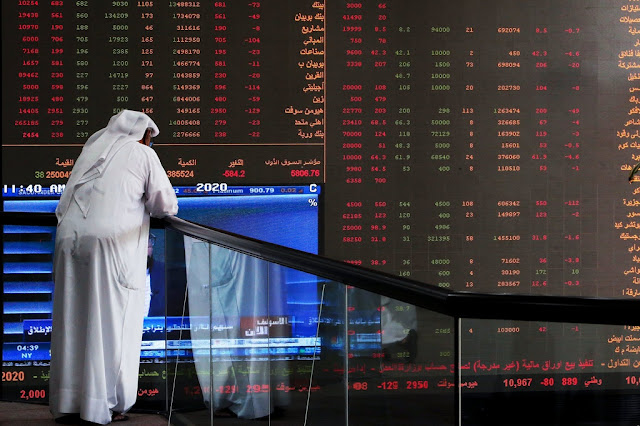Negative oil prices: Once a wild dream, now a reality!
Only as we start thinking that the Corona virus havoc couldn't get any more crazy, it gets Crazier! Yes, oil is now cheaper than water!
With the latest headlines of oil being priced at $0.15/Barrel, crude oil has come to a point where buyers are paid money to buy the oil.
Let's take a look at some statistics.
The world oil prices are controlled by an oligopoly of mainly 3 suppliers, the OPEC (a cartel of 14 nations holding around 80% of global oil reservoirs), USA (the largest producer of oil @ 18% share) and Russia (the 3rd largest oil producer @ 12% share)
The world oil prices are controlled by an oligopoly of mainly 3 suppliers, the OPEC (a cartel of 14 nations holding around 80% of global oil reservoirs), USA (the largest producer of oil @ 18% share) and Russia (the 3rd largest oil producer @ 12% share)
It's main objective is to control the global oil prices by controlling the demand and supply of the oil prices. As an example Saudi Arabia, the leader of the cartel, and the 2nd largest oil producer in the world, never produced more than 10.5 Mn barrels a day (despite having the ability to produce much more) in order to keep a check on the prices.
Russia too informally colluded with the OPEC countries and cut the production of oil to keep the prices stable (later they gave the relation a formal name as OPEC+ countries, but this too collapsed with the recent developments of a price war due to COVID-19)
Taking a look at the oil prices, they nose dived from $60/Barrel in Jan, 2020 to a rock bottom $0.15/Barrel in merely 4 months!
In terms of import of oil, China has emerged as the largest importer of crude at 9.3 Mn barrels a day accounting for 20% of the world's total crude oil imports.
India being on 3rd position, with around 4.8 Mn barrels a day and accounting for appx 10% of global oil imports, has 80% of its petroleum needs fulfilled by imports.
Also, Italy, Spain, France, and Germany together account for around 12.5% of oil imports.
But why is there no demand? Like really! 😒
With a global lockdown there has been a domino fall in the crash of the industries.
 1. A ban on travel and movement of goods, has led the Transportion industry, the biggest consumer of crude oil products (i.e. due to fuel etc) accounting for more than 50% of global crude oil consumption, to a standstill.
1. A ban on travel and movement of goods, has led the Transportion industry, the biggest consumer of crude oil products (i.e. due to fuel etc) accounting for more than 50% of global crude oil consumption, to a standstill.
Be it the sea, air, rail or road transport everything is shut.
Hence, NO DEMAND there.
Hence, NO DEMAND there.
2. As per reports the 2nd largest consumer for crude oil is for petrochemical products like Plastic, Rubber, Adhesive, Paint, Detergents and more. These are used as raw materials etc for a large number manufacturing companies as well but due to halted productions across all the industries, NO DEMAND there either.
 3. Aviation industry being the 3rd largest consumer of petroleum products has taken a beating due to a ban on air travel.
3. Aviation industry being the 3rd largest consumer of petroleum products has taken a beating due to a ban on air travel.
Again NO DEMAND!
But why is there such a glut of oil in the world? Why can't we just cut of the supply and control the price?
1. In order to sell at a competitive price compared to USA and Russia, the Saudi Prince has decided to supply oil at deep discount and to increase supplies to 12.3 Mn barrels a day.
3. One interesting player in the game is Mexico. Mexico's economy is highly dependant on crude oil export and it's state owned oil producing company Pemex is in $100 Bn worth of debt. This oil price war could've been a death blow for Mexico but the Mexican govt had entered into a hedging strategy to protect it's domestic oil industry.
It is like buying an insurance on the price of oil. This gives the Mexicans a right to sell oil at a particular price to the other party.
Hence, Mexico refused to sign the deal to reduce oil production.
So basically if we try to make a demand supply curve for crude oil, we would see an abundantly excessive supply of oil with no corresponding demand!
But what takes the price of a commodity below zero?
Well this is where the game play of financial instruments comes into picture.
Let's say you are an investor and want to speculate on the price of crude oil.
You enter into a contract to buy oil at a pre-determined rate. Usually these financial instruments do not involve delivery of the underlying asset because the position is squared off at expiry by taking a reverse position and a net profit/loss amount is paid by the respective parties.
But, there's a problem this time; the speculators are unable to reverse their positions as nobody is ready to buy crude oil.
Well this is where the game play of financial instruments comes into picture.
You enter into a contract to buy oil at a pre-determined rate. Usually these financial instruments do not involve delivery of the underlying asset because the position is squared off at expiry by taking a reverse position and a net profit/loss amount is paid by the respective parties.
But, there's a problem this time; the speculators are unable to reverse their positions as nobody is ready to buy crude oil.
So if that's the case then at the most oil should be sold at $0/barrel right?
Well the issue here is that speculators are never interested in the delivery of these goods. It invites storage costs, cost to carry such goods and problems of its own.
USA is exploiting these low prices by filing up its strategic reserves in Louisiana and Texas.
Well the issue here is that speculators are never interested in the delivery of these goods. It invites storage costs, cost to carry such goods and problems of its own.
USA is exploiting these low prices by filing up its strategic reserves in Louisiana and Texas.
But once the capacity of these reserves are maxed out too, then there will be oil which is sucked out of the ground, but nobody to consume or store it. And it isn't that easy to just dump the oil either.
Well considering a small investor it may sound fine but it's a really nightmare for the bigger players of the market such as hedge fund managers, investing millions and billions of dollars in the crude oil segment. The volume is HUGE!
So if the other oil exporting nations have to sell oil at a price below cost and god forbid, at negative prices, their economies will collapse, especially if it’s a weak economy, like a Venezuela or Nigeria.
So it's going to be a really tough time for crude oil. Mainly due to the ill-timed price wars, the dried up demands, changing outlooks among people to shift towards cleaner and renewable sources of energy and many other factors.
India is one of the largest consumer of crude oil with it's 2018-19 crude oil bill of $112 Bn.
India can enjoy the benefit of these reduced prices to strategically reduce it's dependency on imports and at the same time reduce the current account deficits. Could save it's domestic industries with these cost savings? Let's see what NaMo has to say about it.
India can enjoy the benefit of these reduced prices to strategically reduce it's dependency on imports and at the same time reduce the current account deficits. Could save it's domestic industries with these cost savings? Let's see what NaMo has to say about it.
Tough times indeed bring tough circumstances.
Let's see what's next!
Stay Home, Stay Safe!
Let's see what's next!
Stay Home, Stay Safe!




















This is a well formulated and fact based article. Great job
ReplyDeleteThanks a lot! Glad you liked it!
DeleteYour support helps us to continue writing such blogs! 👍